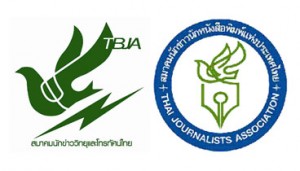ตามที่รัฐบาลประกาศใช้ พ.ร.บ. รักษาความมั่นคงภายในราชอาณาจักร พ.ศ.2551 เป็นเวลา 10 วัน ตั้งแต่วันที่ 1-10 สิงหาคม 2556 ในพื้นที่ 3 เขตของกทม. คือ เขตดุสิต พระนคร และป้อมปราบศัตรูพ่าย ทั้งนี้เพื่อรองรับสถานการณ์การชุมนุมทางการเมือง
สององค์กรวิชาชีพสื่อ โดยสมาคมนักข่าววิทยุและโทรทัศน์ไทย และ สมาคมนักข่าวนักหนังสือพิมพ์แห่งประเทศไทย ขอยืนยันถึงเสรีภาพของสื่อมวลชนที่จะสามารถเข้าทุกพื้นที่ของการชุมนุมทางการเมืองเพื่อนำเสนอข้อมูล ข้อเท็จจริงให้ประชาชนได้รับรู้ แต่จากเหตุการณ์ การชุมนุมทางการเมืองที่ผ่านมา มีสื่อมวลชนหลายคนเสียชีวิตและได้รับบาดเจ็บจากเหตุการณ์ความรุนแรง เพื่อความปลอดภัยในการทำหน้าที่ของสื่อมวลชน สมาคมนักข่าวทั้งสอง จึงประชุมร่วมกับ สำนักงานตำรวจแห่งชาติ เพื่อวางแนวปฏิบัติร่วมกันดังนี้
1. กรณี “ปลอกแขน” สำหรับนักข่าวนั้น มีวัตถุประสงค์เพื่อให้เจ้าหน้าที่ตำรวจสามารถสังเกตเห็นนักข่าวได้จากระยะไกล หรือในสภาวะชุลมุน แต่ปลอกแขนไม่ใช่สัญลักษณ์ที่ระบุถึงการลงทะเบียนว่านักข่าวคนใดที่สามารถทำข่าวในพื้นที่ได้ ทั้งนี้ตามกรอบสิทธิเสรีภาพของวิชาชีพสื่อสารมวลชนแล้ว นักข่าวย่อมได้รับการคุ้มครองในการปฏิบัติหน้าที่ในสนามข่าว โดยทางสมาคมนักข่าวฯ ได้เน้นย้ำกับ สำนักงานตำรวจแห่งชาติ ว่า ให้ใช้ดุลยพินิจตามกรอบกฎหมายพื้นฐาน โดยอาศัยเจตนา และ พฤติกรรม ของนักข่าวและสื่อสารมวลชนในการปฏิบัติหน้าที่ หากนักข่าวมิได้แสดงเจตนา หรือ พฤติกรรม ในการยั่วยุ หรือ ส่งเสริมให้เกิดความรุนแรงในพื้นที่ นักข่าวที่อยู่ในสถานการณ์การชุมนุมไม่ถือว่าเป็นผู้ร่วมชุมนุม และ จะต้องได้รับการพิทักษ์คุ้มครองสิทธิในการปฏิบัติหน้าที่โดยสมบูรณ์ ไม่ว่านักข่าวผู้นั้นจะสวมปลอกแขนหรือไม่ก็ตาม
ทั้งนี้ในระหว่างปฏิบัติหน้าที่ สมาคมนักข่าวฯ ขอให้นักข่าวติดปลอกแขนของสมาคมนักข่าววิทยุและโทรทัศน์ไทย, สมาคมนักข่าวนักหนังสือพิมพ์แห่งประเทศไทย และพกบัตรนักข่าวของหน่วยงานต้นสังกัด ซึ่งหน่วยงานต้นสังกัดสามารถขอปลอกแขนดังกล่าวได้ที่สมาคมนักข่าวฯ โดยให้ทำจดหมาย ถึง นายกสมาคมฯ เพื่อระบุจำนวนปลอกแขนที่ต้องการ ส่วนการออกหมายเลขที่จะเขียนบนปลอกแขนนั้นให้หน่วยงานต้นสังกัดดำเนินการเอง
สมาคมนักข่าวฯ สนับสนุนให้หน่วยงานต้นสังกัด ทำหนังสือถึงนายกสมาคมนักข่าวฯ เพื่อประสานงานขอปลอกแขนดังกล่าว ส่วนสำนักข่าว และ นักข่าวที่ไม่ได้สังกัดกับทางสมาคมนักข่าวฯ เช่น นักข่าวอิสระ นักข่าวภูมิภาค และ นักข่าวต่างประเทศ ก็สามารถดำเนินการขอปลอกแขนดังกล่าวจากสมาคมนักข่าวฯ ได้ โดยนำหลักฐานจากต้นสังกัด หรือ สำนักข่าวที่ตนเองทำข่าวมายืนยัน
2. “การจัดพื้นที่ปลอดภัย” และ “การให้เวลาเพียงพอ” ทางสำนักงานตำรวจแห่งชาติ ได้รับปากและยืนยันว่า ในกรณีที่จะมีการสลายการชุมนุม หรือ ระงับเหตุรุนแรงที่อาจเกิดขึ้น ทางสำนักงานตำรวจแห่งชาติ จะประกาศเตือนอย่างเป็นระบบ และ ให้เวลาเพียงพอ แก่สื่อมวลชนในพื้นที่ในการเคลื่อนตัวออกจากพื้นที่ ที่อาจมีความรุนแรง แต่ในกรณีที่สื่อมวลชนเลือกที่จะปฏิบัติงานในพื้นที่ต่อ ในขณะที่เกิดเหตุรุนแรง ทางสำนักงานตำรวจแห่งชาติ จะจัดพื้นที่ปลอดภัยให้กับสื่อมวลชน ในกรณีที่มีการใช้ แก๊สน้ำตา หรือ เครื่องมือปราบจลาจลรูปแบบต่าง ๆ โดยสื่อมวลชนต้องแสดงปลอกแขนที่มีรหัสตัวเลขร่วมกับบัตรสื่อมวลชนจากหน่วยงานต้นสังกัดในการเข้าพื้นที่ปลอดภัยดังกล่าว
3. ทางสมาคมนักข่าววิทยุและโทรทัศน์ไทย, สมาคมนักข่าวนักหนังสือพิมพ์แห่งประเทศไทย และสำนักงานตำรวจแห่งชาติ จะมีเจ้าหน้าที่ประสานงานกลาง เพื่อทำหน้าที่ประสานความเข้าใจและแก้ไขปัญหาเฉพาะหน้าร่วมกัน ในกรณีที่มีความเข้าใจคลาดเคลื่อนเกิดขึ้น โดยสื่อมวลชนสามารถสอบถามชื่อของผู้ทำหน้าที่ประสานงานกลางได้จากองค์กรวิชาชีพสื่อ หรือ สำนักงานตำรวจแห่งชาติ
ทั้งนี้องค์กรวิชาชีพสื่อ ขอสนับสนุน ให้สื่อมวลชนทุกแขนงทำหน้าที่ในการเสนอข่าวสารและแสดงความคิดเห็นอย่างเข้มแข็ง เพื่อประโยชน์และสิทธิในการรับรู้ข้อมูลข่าวสารของประชาชนอย่างแท้จริง และเรียกร้องให้ผู้ที่เกี่ยวข้องเคารพสิทธิเสรีภาพ และเข้าใจในการปฏิบัติหน้าที่ของสื่อมวลชนที่ปฏิบัติหน้าที่ เพื่อนำความจริงมาเสนอต่อสาธารณชนอย่างครบถ้วนรอบด้าน
สมาคมนักข่าววิทยุและโทรทัศน์ไทย
สมาคมนักข่าวนักหนังสือพิมพ์แห่งประเทศไทย
3 สิงหาคม 2556
Thai Journalists Association & Thai Broadcast Journalists Association
Joint Statement
Media’s conducts for news coverage under the Internal Security Act imposed between 1-10 August 2013
The Thai government has announced imposition of the Internal Security Act for 10 days in three districts of Bangkok including Dusit, PhraNakhon and PomPrapSattruPhai, as a measure to handle scheduled political rallies.
Thai Journalists Association (TJA) and the Thai Broadcast Journalists Association (TBJA) affirm the press freedom and that the media should be able to enter all the rallies’ areas safely for news coverage. However, a lot of journalists were killed or injured from the violence during political demonstrations in the past. Therefore, to ensure safety for the media on duty, the two associations had a meeting with the Royal Thai Police and reached following agreements:
1. All journalists have the rights to cover news in protest areas and be protected by laws. Meanwhile, a journalist on duty in any protest area must not be regarded as a protester.
A “Press” armband issued by TJA and TBJA is aimed at allowing police officers to be able to easily notice a journalist from a long distance or in a situation of chaos. It is not a symbol of registration to enter a protest area. Therefore, a police officer must follow the law and use reasonable judgment in treating any professional journalist who work honestly and do not have any provocative behavior, regardless whether the journalist is wearing the “Press” armband or not.
Nevertheless, TJA, TBJA hereby advise journalists to wear the “Press” armband issued by the two associations and carry their organization’s identification card at all time of the news coverage. News agencies are urged to submit a letter to the TJA’s or TBJA’s president, identifying the required number of Press armbands for the agency’s journalists as well as the list of assigned journalists. The armbands can be acquired at the TJA, TBJA’s headquarters: 538/1 Samsen rd., opposite to Vajira Hospital, Dusit, Bangkok
Tel: 02-668-9422, 02-2438479 ; Fax: 02-668-7505 or visit www.tja.or.th or www.thaibja.org.
The Press armbands are also available for independent journalists, provincial journalists and foreign journalists. They can submit a certified letter from their news agency, or the media outlet they contribute to, as the required document.
2. The Royal Thai Police agree to systematically and properly alert the media prior to any protest dispersal or possible use of harsh measures to end violence. Police agree to provide “safety zones” and “adequate time” for the media to move to the safety zones prior to police’s use of tear gas or other chaos control measures. The media are required to show their armband as well as press identification card issued by their agencies to enter such areas.
3. TJA, TBJA and the Royal Thai Police have appointed particular coordinators to ensure correct mutual understanding and to coordinate in case of emergency. Their names are available at the TJA, TBJA and the Royal Thai Police headquarters.
Professional media are responsible for free and fair news coverage on the all-round basis for the sake of people’s rights to information. The professional media associations, TJA and TBJA, urge all the media and people involved to respect such professionalism.
Thai Journalists Association,
Thai Broadcast Journalists Association
3 August 2013



